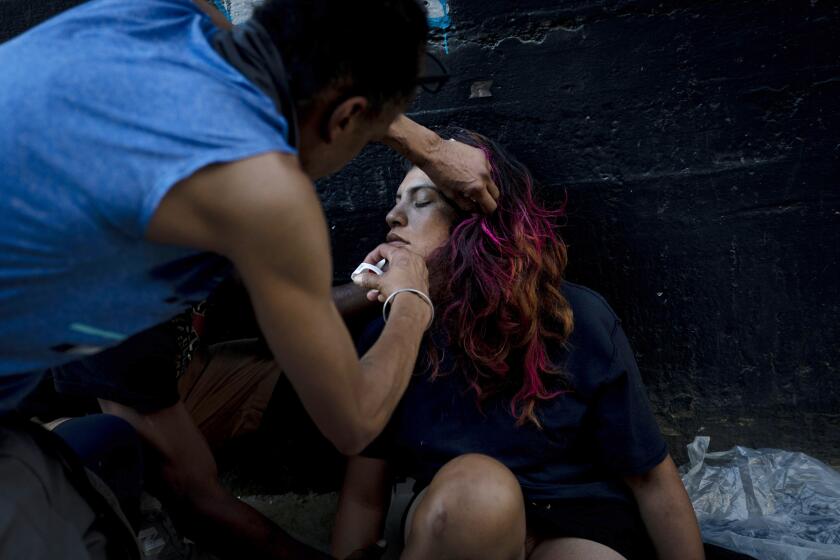FBI probes Snapchat’s role in fentanyl poisoning deaths

- Share via
Federal agencies are questioning Snapchat’s role in the spread and sale of fentanyl-laced pills in the United States as part of a broader investigation into the deadly counterfeit drug crisis.
FBI agents and Justice Department attorneys are zeroing in on fentanyl poisoning cases in which the sales were arranged to young buyers via Snapchat, according to people familiar with the matter who were not authorized to discuss it publicly and requested anonymity. The agents have interviewed parents of children who died and are working to access their social media accounts to trace the suppliers of the lethal drugs, according to the people.
In many cases, subpoenaed records from Snapchat have shown that the teenagers thought they were buying prescription painkillers, but the pill they swallowed was pure fentanyl — a synthetic opioid 100 times more potent than morphine. An FBI spokesperson would neither confirm nor deny the existence of an investigation. The Justice Department declined to comment.
On Wednesday, the involvement of technology companies in the ongoing fentanyl crisis will be discussed on Capitol Hill at a House Energy and Commerce Committee roundtable. One of the listed speakers, Laura Marquez-Garrett, an attorney with the Social Media Victims Law Center, said Snapchat will be the focus.
“The death of American children by fentanyl poisoning is not a social media issue — it’s a Snapchat issue,” she said.
Amid the nation’s fentanyl crisis, group calls on the Justice Department to clamp down on social media’s role in the spread of the synthetic opioid.
Santa Monica-based Snap, which makes Snapchat, said it has worked with law enforcement for years to clamp down on illegal activity on its platform and has boosted moderation efforts to detect illegal drug sales. Last year, Snap said it removed more than 400,000 user accounts that posted drug-related content.
“We are committed to doing our part to fight the national fentanyl poisoning crisis, which includes using cutting-edge technology to help us proactively find and shut down drug dealers’ accounts,” Rachel Racusen, a Snap spokeswoman, said in an emailed statement.
Drug deaths among American teenagers have soared in recent years, and illicitly manufactured fentanyl has led that surge. From 2019 to 2021, the median monthly number of overdoses among adolescents in the U.S. climbed 109%, with fentanyl-related deaths among the same 10-to-19-year-old cohort soaring 182%, according to statistics from the Centers for Disease Control and Prevention. About a quarter of the incidents have been linked to counterfeit pills.
Although dealers use many social media platforms to advertise their drugs, experts, lawyers and families say Snapchat is the platform of choice for arranging sales. Dealers prefer to use Snapchat because of its encrypted technology and disappearing messages — features that have given the platform an edge over its rivals for fully legitimate reasons and helped it become one of the world’s most popular social media apps for teens.
As California leads the fight to reverse skyrocketing fentanyl overdose deaths, organizations that distribute overdose reversal drugs worry their increasingly bold efforts to save lives will land them in legal trouble.
Former White House drug czar Jim Carroll said drug traffickers are always going to flock to where the young people are. “From everything I have read, I do believe that Snapchat has been more widely used for facilitating drug sales” than other platforms, said Carroll, who serves on Snap’s safety advisory council and now works for Michael Best Consulting. “I think that’s because of its popularity among the young.”
In December, Snap reported 363 million daily active users in its quarterly earnings report. That same month, the National Crime Prevention Council wrote a letter to Atty. Gen. Merrick Garland, urging the Justice Department to investigate Snap and its business practices. “Snapchat has become a digital open-air drug market allowing drug dealers to market and to sell fake pills to unsuspecting tweens and teens,” the letter said. Garland didn’t respond, but federal investigators have started to ask questions, multiple people said.
Snapchat is facing increasing scrutiny — and not just from the feds, or House Republicans. In the last year, dozens of grieving families from across the country have filed lawsuits against the platform, alleging it aided and abetted in the sale of counterfeit pills to their kids. The lawsuits claim Snapchat is slow to respond to police subpoenas and can take months to remove known drug dealers from its platform.
Marquez-Garrett at the Social Media Law Victims Center is representing more than two dozen families who have lost children to fentanyl poisoning and said in almost all of these cases, the drugs were purchased via Snapchat. “Before Snapchat existed, there was no way for these dealers to find these kids, and no way to get the drugs to them,” she said. “Now, they can have it delivered like a freaking pizza.”
One drug dealer who used Snapchat has been connected to the deaths of two young adults in Orange County, according to one of the complaints filed by Marquez-Garrett in California Superior Court. Alexander Neville, 14, and Daniel Elijah Figueroa, 20, both purchased what they thought were prescription painkillers from deals arranged on the app. The pills they took were 100% fentanyl.
Two days before he died, Neville told his mother he had purchased Oxycodone from somebody on Snapchat. He told her he was scared because he already wanted more. His mother, Amy Neville, booked him into a treatment facility, but the next morning she found him lying on his bedroom floor, lifeless. His fingers and lips were blue.
“I didn’t understand how he could have taken so much oxy he died,” Amy Neville said. “That was the day we learned about fentanyl.”
The Drug Enforcement Administration subpoenaed Snapchat for her son’s messages and, the complaint states, it took nine months for the platform to respond. Once it did, evidence showed Alexander had met with a dealer from Snapchat called Aj Smokxy.
Three months later, Figueroa was found slumped over a bed at his grandmother’s house. Police subpoenaed Snapchat for his messages, too, and found that he had arranged to purchase Percocet from a dealer who used the Snapchat account Arnoldo_8286. It took Snapchat seven months to remove the dealer from its platform, the complaint states. It also adds that this dealer was allegedly supplied by Aj Smokxy.
Snapchat said it can’t comment on pending litigation. However, a joint status report filed Jan. 18 provides insight into the company’s planned defense strategy. Snap will be seeking to dismiss the case, according to the report, on the grounds that Section 230 of the Communications Decency Act shields the platform from being held liable over the content posted on its site by third parties.
More to Read
Inside the business of entertainment
The Wide Shot brings you news, analysis and insights on everything from streaming wars to production — and what it all means for the future.
You may occasionally receive promotional content from the Los Angeles Times.












